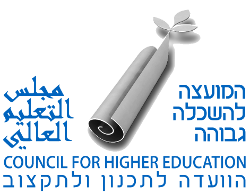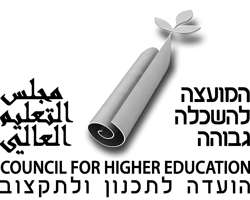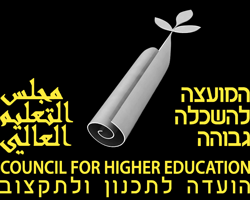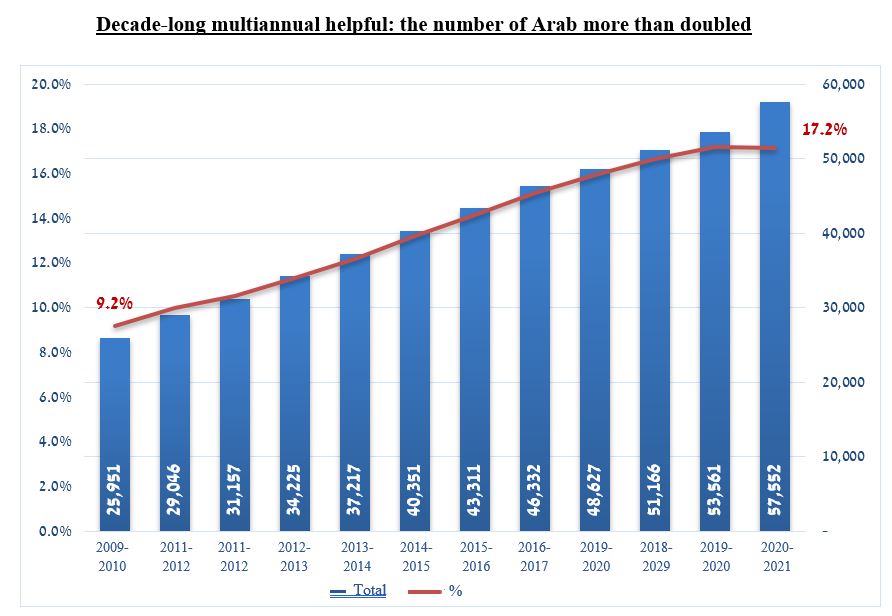Accessibility of higher education in the Arab Sector
Some 58,000 Arab students, who constitute 17% of all students in Israel, relative to their percentage of the population (21%).
- The number of Arab students approved by 122% within a decade (2011-2021)
- Bachelor’s degree – The number of students grew by 106%.
- Master’s degree – The number of students grew by 228%.
- PhD – The number of students grew by 133%.
The number of Arab students at higher education institutions continued to grow in 2020-2021, which cross the 50,000 students threshold for the first time in 2018-2019, and reached 50,000 students and 2020-2021. This represents an increase of 122% between 2009-2021.
In 2009-2010, the number of Arab bachelor’s degree students was only 22,268, and they constituted 10% of bachelor’s degree students in Israel. In 2020-2021, 45,856 Arab bachelor’s degree students attended in Israel, and they constituted 18% of all bachelor’s degree students.
The number of Arab master’s degree students grew by 228% between 2009-2021. If, in 2011-2012, there were only 3270 Arab master’s degree students in Israel, who constituted only 6.5% of all master’s degree students in Israel, by 2020-2021, their numbers grew to 10735, and their percentage out of the total number of master’s degree students grew to 16%. A substantial increase in the number of Arab master’s degree students has taken place particularly this year. There were 1500 more students in 2020-2021 relative to 2019-2020 (900 of them at non-budgeted institutions), with the average growth between each year over the 10 preceding years amounting to 600 students.
Between 2009-2010 and 2020-2021, a substantial increase of 133% was also observed among PhD candidates, such that, in 2020-2021, there were 961 Arab PhD candidates, constituting 8% percent of all PhD candidates in Israel, relative to only 413 students in 2009-2010.
Multiannual Outlook – Arab students by degree
| Bachelor’s Degree | Master's degree | PhD | Total | |
| 2009-2010 | 22,268 | 3,270 | 413 | 25,951 |
| 2010-2011 | 24,346 | 4,243 | 457 | 29,046 |
| 2011-2012 | 25,843 | 4,847 | 467 | 31,157 |
| 2012-2013 | 28,481 | 5,233 | 511 | 34,225 |
| 2013-2014 | 30,969 | 5,692 | 556 | 37,217 |
| 2014-2015 | 33,571 | 6,165 | 615 | 40,351 |
| 2015-2016 | 35,758 | 6,929 | 624 | 43,311 |
| 2016-2017 | 37,441 | 8,197 | 694 | 46,332 |
| 2017-2018 | 39,160 | 8,708 | 759 | 48,627 |
| 2018-2019 | 41,087 | 9,251 | 828 | 51,166 |
| 2019-2020 | 43,454 | 9,252 | 855 | 53,561 |
| 2020-2021 | 45,856 | 10,735 | 961 | 57,552 |
The increased integration of Arab students is the result of a comprehensive and holistic program implemented by the PBC, which starts in high school and persists well into the students’ advanced degree studies.
The number of Arab students in academia has more than doubled over the past decade, and currently amounts to 58,000 students. This significant increase, inter alia, is the result of a holistic and extensive program the PBC and CHE have been operating for the past 9 years. The program begins during the student’s high school years, and it includes their exposure to academia, and continues in the form of incentives and assistance over the course of various academic stages, beginning with pre-academic programs, through to bachelor’s degrees, and continued assistance with advanced degrees – master’s degrees, PhD and postdoctoral studies, and culminating in the appointment of academic staff members at institutions.
The PBC’s “Ruad Program” for high school students is active in 72 settlements, and it provides exposure, information, and assistance with choosing one’s field of study for students attending 173 high schools within the Arab sector, including support for relevant courses (e.g.: SATs (the Israeli “psychometric exam”), preparations for the YAEL Hebrew exam and the AMIR English exam). Tours at academic institutions and higher education fairs take place in collaboration with institutions within those settlements.
In the framework of pre-academic and bachelor’s degree studies, designated assistance programs for the Arab sector are used to reduce the number of dropouts and improve academic achievement, and these include language lessons (Hebrew and English) and extensive academic support, in addition to financial and social assistance.
The most significant supports that’s provided to bachelor’s degree students is primarily provided during the first academic year because that particular year is replete with challenges, and success in that year decreases dropout rates and substantially increases the chances of successfully completing the entire degree. The “Irtaka” scholarship is granted during the student’s bachelor’s degree studies (budgeted by the PBC and operated by PERAKH). The scholarship is awarded to 2200 students every year, of whom 800 are new students that start their freshman year. In the last academic year (2020-2021), the PBC approved a larger number of scholarships (it increased to 872) on a one-time basis. The scholarship is awarded to students throughout their degrees. Students are selected on the basis of their socioeconomic status and preferred fields of study in order to bring about diversity in terms of those fields of study that are needed in the Israeli job market, and which are underrepresented in the Arab sector, e.g., high tech, psychology and art. Fields of studies are diversified by means of various PBC programs, such as Ruad, designated engineering programs and preparatory programs and the “High-tech Achievements Program,” which brings young people from peripheral regions, including large numbers of Arabs, to high-tech fields.
Designated career centers were also established for the Arab sector at academic institutions (that receive budgeting from the PBC), which provide assistance with the students’ preparation for the job market. The PBC also supports the encouragement of outstanding achievements and extensively grants excellence scholarships for advanced degrees to Arab Israelis, and this includes master’s degrees (research-based), PhD’s and post-docs, and it supports the incorporation of outstanding academic staff members from among the Arab sector.
MAOF scholarships for the integration of outstanding academic staff members from the Arab sector: over the past decade (2012-2022), the PBC awarded 55 MOAF scholarships, amounting to NIS 37 million, to outstanding academic staff members from the Arab sector. MAOF Scholarships are intended for outstanding young scientists from the Arab sector. They are intended to enable the incorporation of eligible students into PBC-budgeted higher education institutions in Israel – universities and academic colleges, in addition to the existing programs, and by way of adding designated positions. The institutions are committed to incorporating scholarship recipients as full-time staff members at the end of their scholarship.
Incorporation of Bedouin students into Israeli academia: with regard to the Bedouin sector, and pursuant to Government Resolution 2397 of February 12, 2017 on the subject of the “Program for the Economic and Social Development of the Bedouin Population in the Negev – 2017-2021,” the PBC decided to encourage higher education institutions to increase the number of Bedouin students in the Negev that begin their first year of their bachelor’s degree, until the end of the multi-annual program, at a rate of 75% of their numbers in 2015-2016. Accordingly, the target number of first-year students by 2021-2022 is at least 1500 students, with an emphasis on high-quality integration into academic degrees and employment-oriented occupations. In 2019-2020, 1270 Bedouin students began their freshman year, and 4000 students attended bachelor’s degree studies at all higher education institutions.
Pursuant to the government’s resolution, a joint professional team was formed that consisted of PBC and CHE representatives and representatives of the relevant Ministries: the Budget Department of the Ministry of Finance, the Ministry of Agriculture (Bedouin Administration), and the National Economics Council at the Prime Minister’s Office, whose purpose was to formulate a suitable policy. After an extensive learning and thinking process, the team recommended the incorporation of bitumen Bedouin students into the existing budgeted academic system and the regular programs, together with all students, providing a holistic response to the unique needs of Bedouin students from the Negev.
Designated programs for Bedouin sector in the Negev – Gateway to Academia: several models were examined, including the “Gateway to Academia” pilot, which began in 2015-2016 at Sapir Academic College, which enables the separate preparation for academic integration together with several points of interaction with all students in order to minimize concerns and alienation on both sides, and in order to allow for optimal integration later on. The program provides actual experience with academic studies and preparations for high-quality integration into bachelor’s degree studies in a variety of fields, by providing extensive and personalized assistance, which includes educational support, language studies, social and personal tutoring, financial assistance and summer programs. Accordingly, the PBC/CHE decided to expand the “Gateway to Academia” pilot and add it to several leading academic institutions in the Negev that are budgeted by the PBC as of 2018-2019, while adhering to the principles that emerged as necessary on the basis of research and the knowledge accumulated during the years of the pilot. In addition to the Gateway to Academia Program, it is, of course, also possible to incorporate students into academic studies by using normal methods that are applied to other students.
In 2021-2022, approximately 500 new students are expected to join the program, and it will be attended by 1100 students in four class groups. Originally, NIS 225 million were allocated for the program for 3 class groups (2018-2021), of which the PBC’s share was NIS 130 million, and the remainder consisted of a designated budgetary addition provided by the Ministries of Finance, Agriculture and Education. 2021, the PBC decided to extend the program to 2021-2022, and provided an additional NIS 18 million, taken from the accumulated surplus funds of the General Arab Sector Program.



